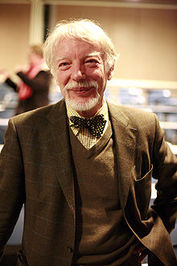Jan Assmann
Born
in Langelsheim, Germany
July 07, 1938
Died
February 19, 2024
Genre

|
Das kulturelle Gedächtnis: Schrift, Erinnerung und politische Identität in frühen Hochkulturen
—
published
1977
—
33 editions
|
|

|
Moses the Egyptian: The Memory of Egypt in Western Monotheism
—
published
1997
—
23 editions
|
|

|
The Mind of Egypt: History and Meaning in the Time of the Pharaohs
by
—
published
1996
—
9 editions
|
|

|
The Price of Monotheism
by
—
published
2003
—
20 editions
|
|

|
The Search for God in Ancient Egypt
by
—
published
1984
—
7 editions
|
|

|
Death And Salvation In Ancient Egypt
by
—
published
2001
—
15 editions
|
|

|
Of God and Gods: Egypt, Israel, and the Rise of Monotheism (George L. Mosse Series in the History of European Culture, Sexuality, and Ideas)
—
published
2008
—
12 editions
|
|

|
The Invention of Religion: Faith and Covenant in the Book of Exodus
by
—
published
2015
—
11 editions
|
|

|
From Akhenaten to Moses: Ancient Egypt and Religious Change
—
published
2014
—
13 editions
|
|

|
ماعت مصر الفرعونية وفكرة العدالة الإجتماعية
by
—
published
1996
—
14 editions
|
|
“Disciplines develop questions of their own and by doing so function as a mnemotechnique of forgetting with regard to concerns of a more general and fundamental character.”
― Moses the Egyptian: The Memory of Egypt in Western Monotheism
― Moses the Egyptian: The Memory of Egypt in Western Monotheism
“In decreeing the Decalogue, moreover, YHWH bypasses Moses to address the people as a whole, communicating his will to them in quasi-democratic openness, without the need for any royal or prophetic intermediary. That is not only without precedent in the history of religion; it is also unparalleled in the Hebrew Bible. God’s proclamation of the Decalogue accordingly lies at the heart of the theme of revelation.”
― The Invention of Religion: Faith and Covenant in the Book of Exodus
― The Invention of Religion: Faith and Covenant in the Book of Exodus
“Through the “transference” of the king-god relationship and the king-people relationship to the relationship between God and his people, Assyrian state ideology is converted into Israelite covenant theology. The fact that God makes his covenant with the people as a whole, rather than through the intercession of royalty, priesthood, or some other representative authority, becomes the basis for a new, specific, emphatic, and to some extent “democratic” conception of the people. The people—not Moses, not the seventy elders, not Aaron, not the Levites—assume the role of a sovereign partner in the covenant. This directness of access to God is what lends the biblical concept its democratic force.”
― The Invention of Religion: Faith and Covenant in the Book of Exodus
― The Invention of Religion: Faith and Covenant in the Book of Exodus
Topics Mentioning This Author
| topics | posts | views | last activity | |
|---|---|---|---|---|
| 21st Century Lite...: When I Hit You - Whole Book (Spoilers welcome) (July 2018) | 35 | 68 | Aug 31, 2018 08:08AM | |
| 21st Century Lite...: Austerlitz - 4 - Whole Book (Spoilers Allowed) (Oct 2018) | 33 | 52 | May 22, 2019 10:06AM | |
| Around the Year i...: RoXXie's ATY Challenge 2023 | 53 | 73 | Nov 11, 2022 01:53AM | |
| The Mookse and th...: German Literary Prizes | 52 | 157 | Aug 27, 2025 01:02PM |





































